Unit 5 Topic 1 第一部分 听力
仁爱版英语9下册Unit5_topic1_同步检测试题(含听力材料和答案)
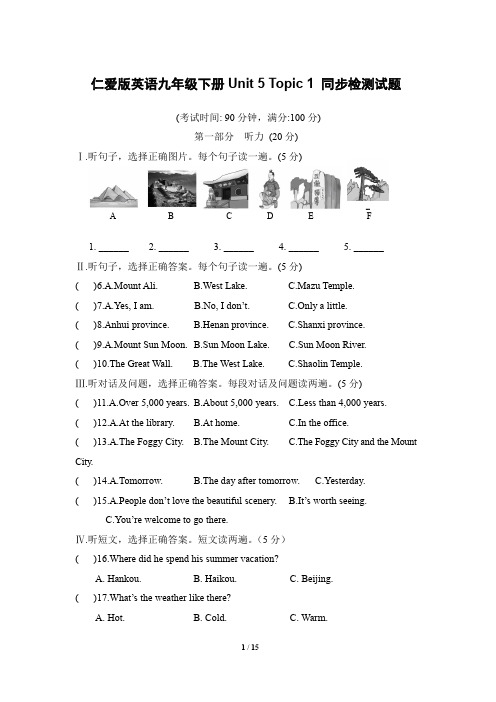
仁爱版英语九年级下册Unit 5 Topic 1 同步检测试题(考试时间: 90分钟,满分:100分)第一部分 听力 (20分)Ⅰ.听句子,选择正确图片。
每个句子读一遍。
(5分)1. ______2. ______3. ______4. ______5. ______ Ⅱ.听句子,选择正确答案。
每个句子读一遍。
(5分)( )6.A.Mount Ali. B.West Lake. C.Mazu Temple.( )7.A.Yes, I am. B.No, I don’t. C.Only a little.( )8.Anhui province. B.Henan province. C.Shanxi province.( )9.A.Mount Sun Moon. B.Sun Moon Lake. C.Sun Moon River.( )10.The Great Wall. B.The West Lake.C.Shaolin Temple. Ⅲ.听对话及问题,选择正确答案。
每段对话及问题读两遍。
(5分)( )11.A.Over 5,000 years. B.About 5,000 years. C.Less than 4,000 years.( )12.A.At the library. B.At home. C.In the office.( )13.A.The Foggy City. B.The Mount City.C.The Foggy City and the Mount City.( )14.A.Tomorrow. B.The day after tomorrow. C.Yesterday.( )15.A.People don’t love the beautiful scenery. B.It’s worth seeing.C.You’re welcome to go there.Ⅳ.听短文,选择正确答案。
九年级英语下册 Unit 5 China and the World Topic 1 China attracts millions of tourists from all over
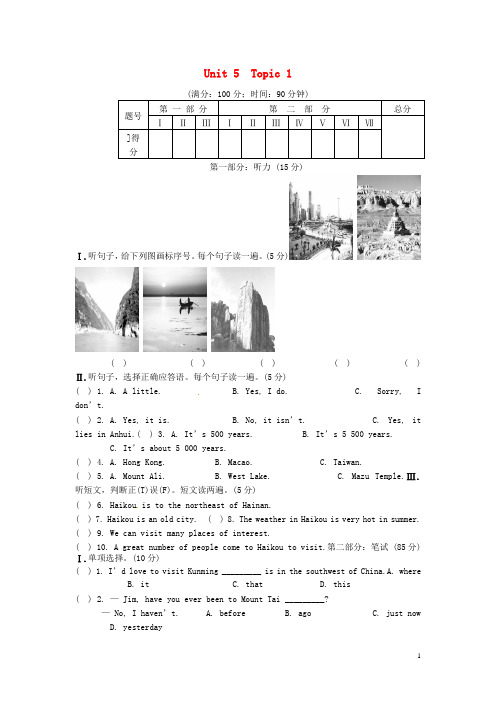
Unit 5 Topic 1题号第一部分第二部分总分ⅠⅡⅢⅠⅡⅢⅣⅤⅥⅦ]得分第一部分:听力 (15分)Ⅰ.听句子,给下列图画标序号。
每个句子读一遍。
(5分)( ) ( ) ( ) ( ) ( )Ⅱ.听句子,选择正确应答语。
每个句子读一遍。
(5分)( ) 1. A. A little. B. Yes, I do. C. Sorry, I don’t.( ) 2. A. Yes, it is. B. No, it isn’t. C. Yes, it lies in Anhui.( ) 3. A. It’s 500 years. B. It’s 5 500 years.C. It’s about 5 000 years.( ) 4. A. Hong Kong. B. Macao. C. Taiwan.( ) 5. A. Mount Ali. B. West Lake. C. Mazu Temple.Ⅲ.听短文,判断正(T)误(F)。
短文读两遍。
(5分)( ) 6. Haikou is to the northeast of Hainan.( ) 7. Haikou is an old city.( ) 8. The weather in Haikou is very hot in summer. ( ) 9. We can visit many places of interest.( ) 10. A great number of people come to Haikou to visit.第二部分:笔试 (85分) Ⅰ.单项选择。
(10分)( ) 1. I’d love to visit Kunming _________ is in the southwest of China.A. whereB. itC. thatD. this( ) 2. — Jim, have you ever been to Mount Tai _________?— No, I haven’t. A. before B. ago C. just nowD. yesterday( ) 3. Go downstairs and _________.A. fetch me the inkB. fetch the ink to meC.fetch the ink me D. fetched the ink for me( ) 4. Mount Song lies _________ Henan Province.A. toB. onC. fromD. in( ) 5. The surrounding areas of West Lake are the _________ of the famous Dragon Well Tea.A. houseB. familyC. homeD. place( ) 6. China is a big country _________ has a history of about 5, 000 years.A. thatB. whoC. in whichD. in that( ) 7. Luoyang _________ “the Home of Peonies(牡丹)”.A. is famous asB. is famous forC. is famousD. called( ) 8. We visited Jokhang Temple and Yangba Well, and also saw so many_________ people and some other places of _________.A. interested; interestedB. interested; interestC. interesting; interestedD. interesting; interest( ) 9. This place is well worth _________.A. visitB. to visitC. visitingD.visits( ) 10. There are a lot of places which _________ by visitors here. They are Shegutai, Wuliu, Huangcangyll and so on.A. must not missB. shouldn’t missC. shouldn’t be missedD.can’t missⅡ.情景交际。
人教版七年级英语下册第五单元测试题及听力原文带答案 Unit 5 Why do you like pandas

人教版七年级英语下册第五单元Unit 5 测试题第一部分听力理解(共15分)一、句子理解。
根据所听句子选择与所听内容相符的图示。
(共5分,每小题1分)( ) 1. A .B .C.( ) 2. A .B. C.( ) 3. A .B. C.( ) 4. A .B. C.( ) 5. A .B. C.二、对话理解。
听录音,选择正确答案。
(共4分,每小题1分)( ) 6. What’s the girl’s favorite animal?A. The giraffe.B. The panda.C. The penguin. ( ) 7. Why does the girl like penguins?A. They’re interesting.B. They’re beautiful.C. They’re cute.( ) 8. Where are giraffes from?A. Australia.B. France.C. Africa.( ) 9. What animals are cute?A. Koalas.B. Dolphins.C. A and B三、短文理解。
听两段录音,选择正确答案。
(共6分,每小题1分)(A)( ) 10. When does Bill sleep?A. In the day.B. At night.C. In the afternoon. ( ) 11. What does Bill eat?A. Grass.B. Leaves.C. Meat.( ) 12. What animal is Bill?A. B. C.( ) 13. Where is Larry from?A. China.B. Australia.C. Africa.( ) 14. How old is Larry?A. 8B. 20C. 10( ) 15. What animal is Larry?A .B .C.第二部分基础知识(共25分)四、单项填空。
七年级英语上册 Unit1Unit2听力资料练习题 仁爱版

Unit 1 Topic 1第一部分听力(20分)Ⅰ.听录音,选出你所听到的字母或单词。
每个读两遍。
(5分)( )1. A. CNN B. end C. F2F( )2. A. UK B. U.S.A. C. NBA( )3. A. morning B. afternoon C. China( )4. A. hi B. hello C. how( )5. A. nice B. fine C. myⅡ.听句子,选择正确图片。
每个句子读两遍。
(5分)6. ____7. ____8. ____9. ____ 10. ____Ⅲ.听录音,选择你所听到的句子。
每个句子读两遍。
(5分)( )11. A. Fine, thanks. B. I’m OK. C. I’m fine. ( )12. A. Good morning. B. Goodbye. C. Good afternoon. ( )13. A. This is my teacher. B. This is Maria. C. This is my mom. ( )14. A. Nice to meet you. B. How are you? C. How do you do? ( )15. A. See you later. B. See you. C. Let’s begin.Ⅳ.听句子,选择正确答语。
每个句子读两遍。
(5分)( )16. A. Fine, thanks. B. How do you do? C. You, too. ( )17. A. Good afternoon. B. Hello! C. Nice to see you, too. ( )18. A. Yes, I am. B. Thank you. C. I’m OK.( )19. A. Good morning, Mike. B. Thank you. C. Goodbye, Mike. ( )20. A. Yes, I am. B. Thank you. C. Fine, thanks.Unit 1 Topic 2第一部分听力(20分)Ⅰ.听单词,选择你所听到的单词。
仁爱英语九年级听力UNIT1
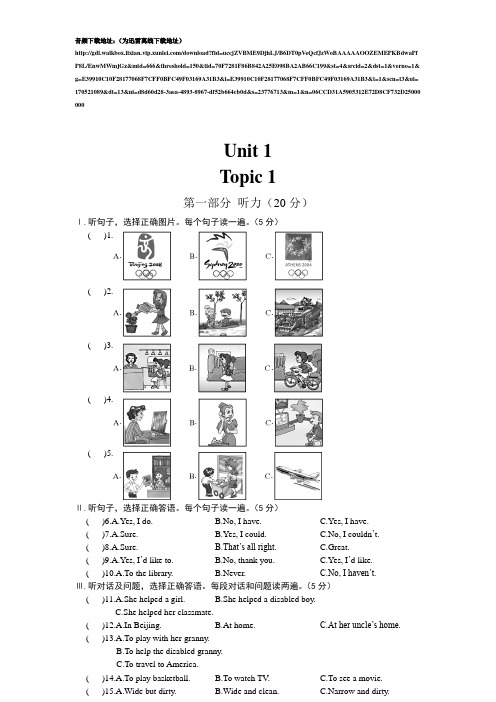
音频下载地址:(为迅雷离线下载地址)/download?fid=uccjZVBME9DjhLJ/B6DT0pVeQcfJzWoBAAAAAOOZEMEPKBdwaPf P8L/EnwMWmjGz&mid=666&threshold=150&tid=70F7281F86B842A25E098BA2AB66C199&st=4&srcid=2&dst=1&verno=1& g=E39910C10F28177068F7CFF0BFC49F03169A31B3&i=E39910C10F28177068F7CFF0BFC49F03169A31B3&t=1&scn=t3&ui= 170521089&dt=13&ni=d8d60d28-3aea-4893-8967-df52b664cb0d&s=23776713&m=1&n=06CCD31A5905312E72D8CF732D25000 000Unit 1Topic 1第一部分听力(20分)Ⅰ.听句子,选择正确图片。
每个句子读一遍。
(5分)( )1.. . .( )2.. . .( )3.. . .( )4.. . .( )5.. . .Ⅱ.听句子,选择正确答语。
每个句子读一遍。
(5分)( )6.A.Yes, I do. B.No, I have. C.Yes, I have.( )7.A.Sure. B.Yes, I could. C.No, I couldn’t.( )8.A.Sure. B.That’s all right. C.Great.( )9.A.Yes, I’d like to. B.No, thank you. C.Yes, I’d like.( )10.A.To the library. B.Never. C.No, I haven’t.Ⅲ.听对话及问题,选择正确答语。
新生代英语基础教程1第二版unit5听力答案

新生代英语基础教程1第二版unit5听力答案一.Teil 1 Linda fragt Fabio. Hör das Gespräch. Welche Antwort ist richtig?(共10小题,每小题 1.5分,共15分)1.Wie alt bist du? [单选题] *a)13 Jahre.b)14 Jahre.(正确答案)2. Lernst du Englisch? [单选题] *a) Ja, Englisch ist toll.(正确答案)b)Nein, ich lerne Deutsch.3. Ist das dein Handy? [单选题] *a) Ja.b) Nein.(正确答案)4. Wie ist deine Telefonnummer? [单选题] *a) 0155 - 53 52 51.(正确答案)b) 0155 - 51 52 535. Magst du Musik? [单选题] *a) Ja, ich mag Pop.b) Ja, ich mag Hiphop.(正确答案)6. Kennst du Casper? [单选题] *a) Ja.b) Nein.(正确答案)Teil2 Was ist das? Hör die Gespräche.7Frau Milan kommt aus [单选题] *a) Münchenb)Stuttgart(正确答案)8.Sie ist [单选题] *a) verheiratetb)nicht verheiratet(正确答案)9.Sie hat a) ein Kind b) zwei Kinder [单选题] *a) ein Kind(正确答案)b) zwei Kinder10.Frau Milan kann [单选题] *1a) kochen2b) nicht kochen(正确答案)Teil 3 Hör das Gespräch und beantworte die Frage (共10小题,每小题1.5分,共15分)11. Was macht Tina gerade? [单选题] *a) Hausaufgabeb) Klavier üben(正确答案)c) Englisch lernen12.Tina hat Zeit um... [单选题] *a) 16:30.b) 17:30.(正确答案)c) 18:30.13.Marc möchte gern... [单选题] *a) Tennis spielen(正确答案)b) Fahrrad fahrenc) Fußball spielen14.Marc....[单选题] *a) fährt mit dem Fahrrad.b) holt Tina ab.c) trifft Tina am Schwimmbad(正确答案)Du hörst zwei Gespräche. Kreuze richtig(a) oder falsch(b).Gespräch 115.Sarah kocht heute Suppe. [单选题]R(正确答案)F16.Sarah braucht noch Gemüse. [单选题]RF(正确答案)17.Ihr Papa kauft auf dem Markt ein. [单选题] *RF(正确答案)18.Frau Huber isst heute im Restaurant. [单选题] RF(正确答案)19.Der Vater von Tom hat Geburtstag. [单选题]R(正确答案)F20.Andrej muss morgen nicht zur Schule. [单选题] R(正确答案)F。
全新版大学进阶英语视听说教程第1册--Unit5听力文本
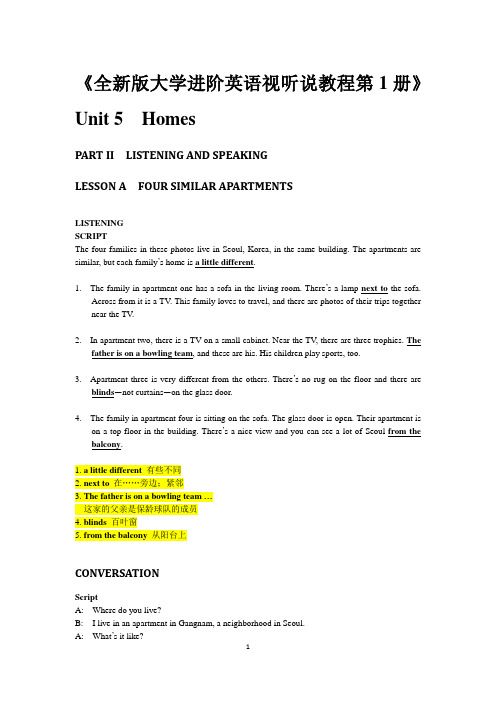
《全新版大学进阶英语视听说教程第1册》Unit 5 HomesPART II LISTENING AND SPEAKINGLESSON A FOUR SIMILAR APARTMENTSLISTENINGSCRIPTThe four families in these photos live in Seoul, Korea, in the same building. The apartments are similar, but each family’s home is a little different.1. The family in apartment one has a sofa in the living room. There’s a lamp next to the sofa.Across from it is a TV. This family loves to travel, and there are photos of their trips together near the TV.2. In apartment two, there is a TV on a small cabinet. Near the TV, there are three trophies. Thefather is on a bowling team, and these are his. His children play sports, too.3. Apartment three is very different from the others. There’s no rug on the floor and there areblinds—not curtains—on the glass door.4. The family in apartment four is sitting on the sofa. The glass door is open. Their apartment ison a top floor in the building. There’s a nice view and you can see a lot of Seoul from the balcony.1. a little different有些不同2. next to在……旁边;紧邻3. The father is on a bowling team …这家的父亲是保龄球队的成员4. blinds百叶窗5. from the balcony从阳台上CONVERSATIONScriptA: Where do you live?B: I live in an apartment in Gangnam, a neighborhood in Seoul.A: What’s it like?B: It has a large living room, two bedrooms, a kitchen, and a bathroom.A: Sounds like a nice place.B: Yeah, it is, but it’s a long way from my school.LESSON B Living SmallListening 1ScriptLiving SmallToday, 50 percent of the people on Earth live in cities. By 2030, it will be 60 percent. With more people in cities, there is less space, and housing costs more. What can we do? Here’s an idea.Container HousingThe city of Amsterdam is using old shipping containers as housing for students and other people. The containers are small—30 square meters (three hundred twenty square feet)—but they are comfortable. There is space for a living area, bedroom, kitchen, and bathroom. These houses are also inexpensive: only a few thousand dollars to buy. Today, the containers are used around the world as homes and student dormitories, as well as shops, offices, and hotels.Tiny HousesIn the U.S., Jay Shafer makes tiny houses for people. The smallest is only 9 square meters (98 square feet). The houses are small, but they have everything you need. On the first floor, there is a kitchen, a living area, and a bathroom. On the second floor is a bedroom. It is big enough for two people. The houses are also inexpensive. Most are $15,000.1. Container Housing集装箱房屋2. Tiny Houses微型房屋Listening 2ScriptM1: I go to school in Amsterdam and I need some place to live. Container homes are comfortable and inexpensive. They’re perfect for students.F1: I don’t know ... I know container apartments are a good idea, but I think they’re ugly. They look like big boxes.M2: A tiny house is perfect for one or two people, but I have a family of four. They’re just too small.F2: Tiny houses are inexpensive to make and buy so you save money. Also, they’re small so you use less water and energy. They’re good for people and the Earth.1.some place to live一个住的地方2. a family of four一家四口人3.save money省钱LISTENING SKILLSScript1) Laura is one of the top students in Grade One.2) Ted likes to sing English pop songs.3) Listening is not a big problem for me.4) Frank can speak six languages fluently.5) I’d like to read novels and short stories in English.6) Bob’s strong local accent makes it difficult for us to understand him.1. one of the top students优秀学生之一2. local accent当地口音PART III VIDEO ECO-FRIENDLY HOMESCRIPTNarrator:This is the Cohen’s home. It’s a three-bedroom house in a suburb in the United States. It’s a nice area, but there is a problem with this house: it uses a lot of energy.But this isn’t surprising. Houses and buildings use forty percent of all the energy in the United States. And many homes waste a lot of energy.Amory Lovins teaches people to save energy in their homes.Today, he is visiting the Cohen’s house. Lovins walks around the house, and he finds different problems. There’s a problem with the heater in one room, and the freezer in the kitchen. Lovins:“Oh, what have we here...?”Narrator:We don’t have to use a lot of electricity in our homes, says Lovins. There are simple ways to save energy.It’s surprising; homes waste a lot of energy, even while you sleep.To save energy in your home, unplug electronics when you’re not using them.Lovins:“Do you see that little red light down in the corner?”Narrator:Now, the TV is off, but it’s still using energy because it’s plugged in. The Cohens pay sixty dollars every year for this extra energy. The Cohen family has lots of electronics. They’re all plugged in. So they’re always using energy.Lovins lives in Aspen, Colorado, in the mountains. His house is very eco-friendly. All of the home’s electricity comes from solar panels.Some days, it’s below -40 degrees Celsius here. But Lovins’ house is warm, thanks to the solar panels.In fact, Lovins’whole house uses very little energy—only 120 watts. That’s a little more energy than you need to turn on one light bulb.It’s a very eco-friendly home.1. a three-bedroom house一幢有三间卧室的房子2.unplug electronics拔出电器的电源插头3.plug in插上电源的插头4.thanks to幸亏;由于。
高中英语:2020人教(新教材)新素养导学必修一 五 Unit 1 Discovering Useful Structures Word含答案
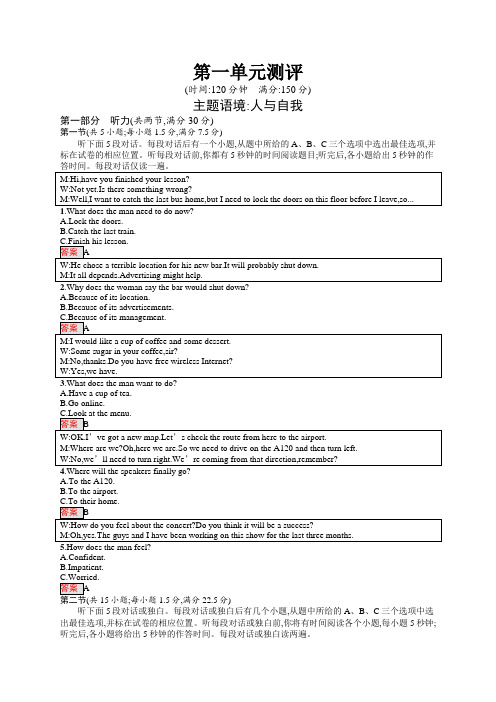
第一单元测评(时间:120分钟满分:150分)主题语境:人与自我第一部分听力(共两节,满分30分)第一节(共5小题;每小题1.5分,满分7.5分)听下面5段对话。
每段对话后有一个小题,从题中所给的A、B、C三个选项中选出最佳选项,并标在试卷的相应位置。
听每段对话前,你都有5秒钟的时间阅读题目;听完后,各小题给出5秒钟的作A.Lock the doors.B.Catch the last train.A.Because of its location.B.Because of its advertisements.A.Have a cup of tea.B.Go online.A.To the A120.B.To the airport.A.Confident.B.Impatient.(共15小题;每小题1.5分,满分22.5分)听下面5段对话或独白。
每段对话或独白后有几个小题,从题中所给的A、B、C三个选项中选出最佳选项,并标在试卷的相应位置。
听每段对话或独白前,你将有时间阅读各个小题,每小题5秒钟;听完后,各小题将给出5秒钟的作答时间。
每段对话或独白读两遍。
听第6段材料,回答第6、7题。
A.Play a game.B.Watch a match.A.China will lose.B.Russia will lose.听第7段材料,回答第8至10题。
A.At the cleaner’s.B.In a restaurant.A.On Saturday evening.B.One week later.A.Satisfied.B.Angry.听第8段材料,回答第11至13题。
A.He’ll have good conversations with others.B.He’ll be limited by what he has prepared.ll become even more nervous.’s the man’s concern?A.He can’t understand people’s questions.B.He has nothing to say.A.Patient.B.Strict.听第9段材料,回答第14至16题。
- 1、下载文档前请自行甄别文档内容的完整性,平台不提供额外的编辑、内容补充、找答案等附加服务。
- 2、"仅部分预览"的文档,不可在线预览部分如存在完整性等问题,可反馈申请退款(可完整预览的文档不适用该条件!)。
- 3、如文档侵犯您的权益,请联系客服反馈,我们会尽快为您处理(人工客服工作时间:9:00-18:30)。
Unit 5 Topic 1 第一部分听力(20分)Ⅰ. 听句子,选择正确图片。
每个句子读一遍。
(5分)( )1. ( )2.A B C A B C( )3. ( )4A B C A B C( )5.A B CⅡ. 听句子,选择正确答语。
每个句子读一遍。
(5分)( )6. A. Oh, I’m not happy. B. The same to you. C. We are all happy.( )7. A. I have no free time. B. How about you? C. I often play basketball.( )8. A. No, I don’t. B. Yes, he does. C. No, I walk to school.( )9. A. Yes, it is. B. You’re right. C. Thank you.( )10. A. I like playing it very much. B. I want to play it very much.C. Three times a week. Ⅲ. 听对话,选择正确答案。
每段对话读两遍。
(5分)( )11. How does Michael usually come to school?A. By buB. By bike.C. On foot.( )12. What does the man often do on Sundays?A. He plays computer games.B. He plays basketball.C. He plays football.( )13. How often does Yu Ming go to the zoo?A. Every month.B. Every day.C. Every week.( )14. How does Miss Wang sometimes come to school?A. By bike. B. By bus. C. On foot.( )15. Where does Zhou Lina usually have lunch?A. In her office.B. At home.C. At school.Ⅳ.Ⅰ. 单项选择。
(10分)( )1. The Browns usually drive to the park on Sundays. But today they go to the park _____ foot. A. in B. on C. by D. of( )2. Bob often _____ his homework after dinner.A. do B. does C. doing D. to do( )3. The boy likes playing _____ basketball very much.A. a B. an C. the D. / ( )4.—_____ does Kangkang meet his friends?—Four times a month.A. How oftenB. How longC. WhenD. What time( )5.—What do you usually do _____ weekdays after school?—I usually read books.A. inB. atC. onD. for( )6. Mr. King sometimes _____ the subway home.A. takeB. taking C. takesD. to take( )7. —What does Fang Yan do in her free time?—She often _____ a movie.A. seesB. watchC. looksD. read( )8. —_____—The same to you.A. Good morning!B. Happy New Year!C. See you later.D. How do you do?( )9. Zhao Lin _____ to Beijing by train often. He usually goes by plane.A. isn’t goingB. doesn’t goC. not goD. don’t go( )10.—Your new dress looks very nice! —_____A. Yes, it is so nice.B. Where? Where?C. Thank you.D. That’s all right.Ⅱ. 情景交际。
(5分)根据对话的情景,从方框中选择适当的句子填在画线处,使对话完整通顺。
其中有两项是多余的。
A: Hi, Wang Li! What time do you usually get up?B: I always get up at about six o’clock.A: 11 How do you usually go to school?B: 12 But sometimes I go to school by bus.A: By the way, where does your mother work?B: She works in a factory. She makes shoes.A: 13 B: She usually goes to work by subway.A:Where does she have lunch?B: 14 It takes her too much time to come back home for lunch.11. 12. 13. 14. 15.Ⅲ. 完形填空。
(10分)On Sundays, Li Lei gets up at six thirty. He has 16 at eight. Then he helps his mother 17 the housework(家务劳动). At ten o’clock he leaves 18 and goes shopping 19 bike. At about eleven o’clock he comes 20 home.He likes 21 very much. He helps his mother with the cooking. They 22 lunch at twelve.In the afternoon he often 23 games with his friends. They have 24 at six thirty. In the evening he does his homework. Sometimes, he 25 TV. He goes to bed at nine.( )16. A. food B. breakfast C. lunch D. supper( )17. A. in B. on C. with D. from( )18. A. home B. house C. room D. classroom ( )19. A. by B. on C. in D. at( )20. A. for B. to C. back D. from( )21. A. cook B. cooking C. the cook D. the cooking ( )22. A. to have B. having C. have D. has( )23. A. plays B. is playing C. takes D. is taking ( )24. A. work B. homework C. housework D. dinner( )25. A. sees B. looks C. is watching D. watchesⅣ. 阅读理解。
(30分)(A) Hi, I’m Zhu Hua. I’m a junior high school student in Beijing. There are twenty-six boys and twenty-two girls in my class. Half of the students come to school by bike. Five boys and four girls come to school on foot. About a quarter of us come to school by bus. The others come to school by subway. We’re all from China. We’re good friends.根据短文内容,完成下面表格。
(B)Alice is my good friend. She is twenty-two years old. Now she lives in Beijing, China. She teaches English in a junior high school. She loves making friends with the students and they like her very much. Every morning she gets up very early. At about 7:00, she usually has a glass of milk and some bread for breakfast at home. Then she walks to work and gets to school at about a quarter to eight. At 12:00 she eats a hamburger and an apple for lunch. Her favorite drink is Coke. She goes home at 5 o’clock in the afternoon. She likes to have noodles(面条)and chicken for dinner. On Sunday, she often comes to see me. Sometimes we go to a Chinese restaurant to have lunch.根据短文内容,选择正确答案。
( )31. Alice is _______.A. a doctor B. a nurse C. a driver D. a teacher( )32. —What does Alice usually have for breakfast at home?—_______ A. A glass of milk and some bread. B. An egg and some bread.C. A cup of coffee and some bread.D. A glass of milk and a hamburger.( )33. Alice gets to school _______ a. m. A. at 8:15 B. at 7:45 C. at 7:40 D. at 8:00 ( )34. —What does Alice often do on Sunday?—She often ________. A. has dinner with me B. goes to the restaurantC. comes to see meD. eats noodles( )35. Which of the following is NOT true?A. Alice lives in China now.B. Alice likes Coke best.C.Alice gets home at 5:00 in the afternoon.D. On weekdays she has a hamburger and an apple for lunch.(C)()36. Li Huimin, Wan Junfeng and Chen Qiang all _____ in their free time.A. watch TVB. meet friendsC. cook foodD. play games()37. Chen Qiang doesn’t _____.A. meet friendsB. cook foodC. watch TVD. A and B()38. Li Huimin and Wang Junfeng _____ in their free time, but Chen Qiang doesn’t.A. go fishingB. watch TVC. meet friendsD. play computer games()39. Wang Junfeng does many things in his free time EXCEPT(除了) _____.A. watching TVB. cooking foodC. going fishingD. playing computer games()40. Which of the following is TRUE?A. Li Huimin and Wang Junfeng doesn’t play computer games.B. Chen Qiang cooks food.C. Wang Junfeng goes fishing.D. Chen Qiang and Wang Junfeng meet friends.Ⅰ. 词汇部分。
